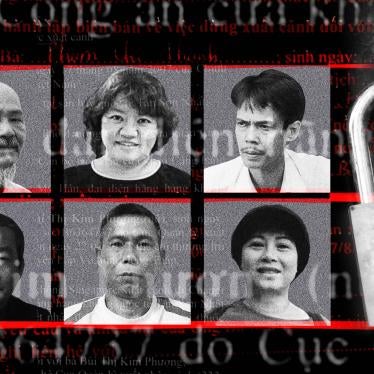The Chinese government should immediately investigate a recent incident in which more than a dozen members of the foreign media were assaulted or intimidated by uniformed Chinese police and plainclothes thugs in downtown Beijing, Human Rights Watch said today. Failure to thoroughly investigate such incidents fosters a culture of official impunity for attacks against the press in China.
"It's unacceptable that the police attack foreign media seeking to cover a public event," said Sophie Richardson, Asia advocacy director at Human Rights Watch. "The Chinese government should show it isn't turning back the clock on media freedom by investigating this incident and holding the perpetrators accountable."
On February 27, 2011, members of the foreign press went to Wangfujing, an area in Beijing that was specified for protests by anonymous calls for peaceful citizen gatherings. The violence occurred when police, without warning, moved to strip journalists at the scene of their camera equipment or to physically remove those reporters from the scene. Police responded with violence against reporters who resisted.
In recent weeks, anonymous messages have circulated on social network sites calling for so-called "Jasmine Revolution" protests in 13 specified Chinese cities every Sunday at 2 pm. The rumors prompted China's Ministry of Foreign Affairs to summon foreign media in advance of February 27, the next Sunday when such a gathering might take place, and warn them to "obey reporting rules" with regard to coverage of any such protests. The work of foreign correspondents in China is governed by October 2008 regulations. These formalize the Chinese government's acceptance of basic reporting rights, including the freedom of foreign correspondents to interview any consenting interviewee without official permission, and created a permanent measurable standard of foreign media freedom in China.
However, on February 26, 2011, Ministry of Foreign Affairs officials contacted several correspondents in Beijing and instructed them to read a directive printed in that day's English-language China Daily. The directive, issued by the Information Office of the Beijing municipal government, stated that, "Journalists must apply for approval, in accordance with relevant laws and regulations, before they conduct interviews in Beijing." That directive contravenes the national rules governing foreign media freedom in China; no relevant authority has clarified how a local government can arbitrarily overrule national regulations. Preventing the foreign press from gathering where demonstrations are expected to take place is an unwarranted intrusion on freedom of expression and information, Human Rights Watch said.
When members of the foreign press arrived at Wangfujing on February 27, hundreds of uniformed police and dozens of police vans were already present. The Foreign Correspondents Club of China (FCCC) reported in a statement on February 27 that "men who appeared to be plain clothes security officers...set upon and repeatedly punched and kicked in the face" a video journalist at the scene and confiscated his camera. The journalist subsequently required medical treatment for severe bruising and possible internal injuries. The FCCC reported that more than a dozen other foreign media on the scene were "manhandled, pushed, detained and delayed by uniformed police and others." Those targeted included reporters from Bloomberg, BBC, CNN, and Germany's ARD television.
"The police response to the foreign journalists was a flashback to the bad old days, and that the offensive to shut down the press took place in downtown Beijing is alarming," said Richardson. "The impulse to control journalists through fear and thuggery - which many Chinese journalists live with every day - seems still to also apply to the foreign media."
At the Chinese Ministry of Foreign Affairs' regular Tuesday press conference on March 1, spokesperson Jiang Yu rejected foreign correspondents' complaints about the February 27 assaults, and said that the authorities had "properly handled" the situation. Jiang implied that foreign correspondents were themselves responsible for the violence they suffered because they had gone to a busy public place to "congregate there and mill around." Jiang said that the authorities would investigate a police complaint filed by a Bloomberg reporter who was assaulted at Wangfujing. There is no evidence yet that the police are actually investigating the incident, and similar official promises in the past to investigate incidents of harassment or violence against foreign correspondents have not resulted in reports to news agencies or public charges.
Jiang also insisted that the rules governing foreign media had not changed. However, the Wall Street Journal reported on March 1 that police had informed its reporters that same day in both Shanghai and Beijing that the designated protest sites in those cities were now "off-limits" to foreign media. Previously, foreign media have only been specifically prohibited from independent reporting in Tibet.
Despite the October 2008 foreign media freedom regulations, correspondents reporting outside of China's major urban centers continue to be frequently obstructed, threatened, and harassed by government officials, security forces, and their agents who are hostile to the presence of foreign media and claim ignorance of the rules guaranteeing their freedom to report. However, violence against foreign media in China's major cities of Beijing and Shanghai is rare and makes the February 27 incident - and the foreign ministry's lack of concern about it - a worrying new development.
"The Chinese government should enforce its existing rules on foreign media freedom rather than flout them," Richardson said. "We'll know the Chinese government has made good on its commitments to investigate when there is a proper investigation, when police are held to account, and when the regulations on foreign media are consistently upheld."






